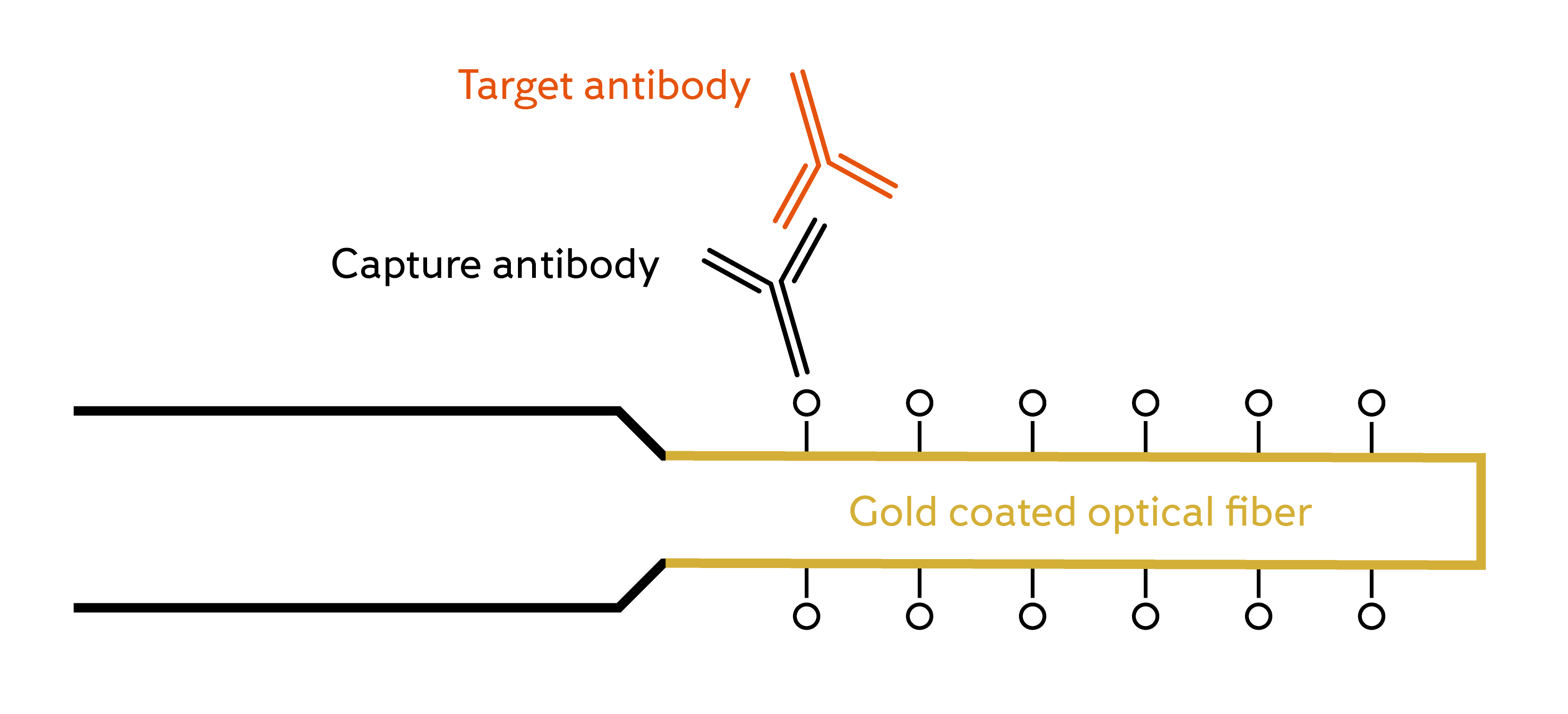
WHITE FOx can accurately detect, quantify and measure the potency of your target of interest in a variety of complex fluids including cell culture and lysates. Label-free nM to µM sensitivities in as little as one minute make our immunoassay biosensor an essential development tool.
- Easy to set up and hands off operation.
- Fast assay time (from 1 to 20 min).
- Clinically relevant sensitivity (0.97 – 80 ng/mL in 100x diluted sample).
- Results better than ELISA, in much less time per sample.
- Minimum sample preparation: no purification.
hIgG screening.
The protein A sensor probe allows for fast label free concentration screening of total hIgG in cell culture samples. With a fast assay time, down to 1 minute, and ng/ml to µg/ml sensitivity with a wide dynamic range with excellent reproducibility this is an ideal tool for rapid screening.
Case study:
Label-free quantification in bioproduction samples
WHITE FOx monitors the production of therapeutic monoclonal antibodies in real time and the dip-in protocol means that 1 to 60 samples can be analyzed straight after collection.
- Faster than ELISA.
- Results within 10 minutes with pre-functionalized probes.
- Measure directly in the sample medium for a rapid turnaround at near-real-time process optimization.
- Highly reproducible.

Calibration curves performed five weeks apart gave almost identical results, highlighting WHITE FOx’s reproducibility.
Relevant publications
Page 1 of 1
White paper: WP7 Versatile and fast IgG screening with the Protein A sensor probe
White paper 7 | Version 2 | Kris Ver Donck, Filip Delport, Laura Marin, Emma Buchet, Kim Stevens SUMMARY FOx BIOSYSTEMS’ fiber-optic surface plasmon resonance technology (FO-SPR) is a robust...
March 20, 2023
Detection of Breast Cancer-Specific Extracellular Vesicles with Fiber-Optic SPR Biosensor
Yildizhan et al. (2023) International Journal of Molecular Sciences DOI: 10.3390/ijms24043764 Extracellular vesicles (EVs) have attracted great attention as potential biomarkers for cancer diagnostics. Although several technologies have been developed…
February 15, 2023
New technology for the development of molecular markers
Georg Johnen, Thomas Brüning, IPA (Institut für Prävention und Arbeitsmedizin der Deutschen Gesetzlichen Unfallversicherung) The detection of specific proteins is the focus of many methods for the diagnosis of occupational…
December 7, 2022
White paper: WP6 Using FO-SPR to select for nanobodies in phage display
White paper 6 | Version 2 | Kris Ver Donck, Dagmara Minczakiewicz, Filip Delport, Kim Stevens Based on original publication: Knez et al. (2013) Analytical Chemistry 85, 10075 - 10082...
April 29, 2022
Innovative FO-SPR Label-free Strategy for Detecting Anti-RBD Antibodies in COVID-19 Patient Serum and Whole Blood
Qu et al. (2022) ACS Sensors DOI: 10.1021/acssensors.1c02215 The ongoing COVID-19 pandemic has emphasized the urgent need for rapid, accurate, and large-scale diagnostic tools. Next to this, the significance of…
January 27, 2022
White paper: WP4 Label-free quantification in bioproduction samples
White paper 4 | Version 4 | Kris Ver Donck², Dagmara Minczakiewicz², Kim Stevens², Gert Struys¹, Thomas Geuens¹, Koen Dierckx¹, Filip Delport² ¹simAbs NV, ²FOx BIOSYSTEMS ABSTRACT This white paper...
October 1, 2021
WHITE FOxTM technical specifications
You can find the technical specifications of the White FOxTM here: DOWNLOAD
April 8, 2021
White paper: WP1 carboxyl probe immobilization for label-free protein quantification
White paper 1 | Filip Delport, Dagmara Minczakiewicz, Kris Ver Donck ABSTRACT This white paper describes a general strategy for optimizing immobilization on the FO-SPR probes and provides some reference...
March 31, 2021
FO-SPR biosensor calibrated with recombinant extracellular vesicles enables specific and sensitive detection directly in complex matrices
Yilidzhan et al. (2021) J. Extracell. Vesicles 10 Extracellular vesicles (EVs) have drawn huge attention for diagnosing myriad of diseases, including cancer. However, the EV detection and analyses procedures…
February 23, 2021
Probing the force-induced dissociation of aptamer-protein complexes
Perez-Ruiz et al. (2014) Anal. Chem. 86, 3084−3091 Aptamers are emerging as powerful synthetic bioreceptors for fundamental research, diagnostics, and therapeutics. For further advances, it is important to gain…
February 20, 2014
Affinity comparison of p3 and p8 peptide displaying bacteriophages using surface plasmon resonance
Knez et al. (2013) Anal. Chem. 85, 10075−10082 Ever increasing demands in sensitivity and specificity of biosensors have recently established a trend toward the use of multivalent bioreceptors. This…
September 30, 2013
Selection of aptamers against Ara h 1 protein for FO-SPR biosensing of peanut allergens in food matrices
Tran et al. (2013) Biosensors and Bioelectronics 43, 245–251 The rising prevalence to food allergies in the past two decades, together with the fact that the only existing therapy…
May 15, 2013
Fast and accurate peanut allergen detection with nanobead enhanced optical fiber SPR biosensor
Pollet et al. (2011) Talanta 83, 1436–1441 This paper is the first report of a fiber optic SPR biosensor with nanobead signal enhancement. We evaluated the system with a…
February 15, 2011
Fiber optic SPR biosensing of DNA hybridization and DNA–protein interactions
Pollet et al. (2009) Biosensors and Bioelectronics 25, 864–869 In this paper we present a fiber optic surface plasmon resonance (SPR) sensor as a reusable, cost-effective and label free biosensor for measuring DNA hybridization and DNA–protein…
December 15, 2009
Page 1 of 1
For Research Use Only. Not for use in diagnostic procedures.


